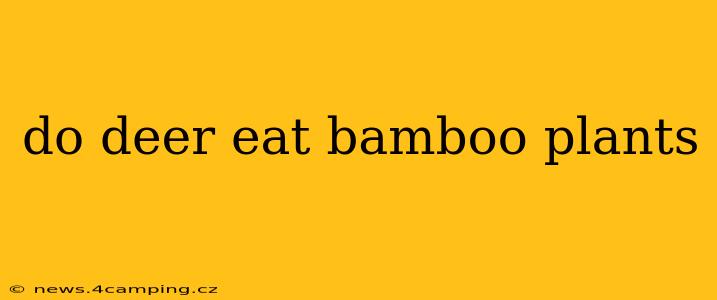Deer are known for their diverse diets, adapting to various environments and readily consuming a wide range of plants. But does this adaptability extend to bamboo? The simple answer is: it depends. While deer can technically eat bamboo, it's not a preferred food source and their consumption of it varies greatly depending on several factors. This article will explore the complexities of deer diets, focusing specifically on their relationship with bamboo.
What Do Deer Typically Eat?
Before we delve into bamboo, let's establish a baseline understanding of a deer's typical diet. Deer are herbivores, meaning their primary food source is plants. Their diet can be broadly categorized as:
- Forbs: These are non-woody flowering plants, including clover, alfalfa, and many wildflowers. These are often high-protein options.
- Grasses: Various grasses form a significant part of a deer's diet, particularly in open fields and meadows.
- Browse: This includes the twigs, buds, and leaves of woody plants like shrubs and trees. Examples include oak leaves, maple leaves, and dogwood.
- Fruits and Nuts: Deer are opportunistic feeders and will readily consume fallen fruits and nuts when available. Apples, acorns, and berries are common examples.
Do Deer Eat Bamboo Shoots?
While deer don't specifically seek out bamboo as a primary food source, they will consume it, especially the young, tender shoots. These shoots are less fibrous and therefore easier to digest than the mature stalks. However, the extent of their consumption depends on the availability of other preferred food sources. If food is scarce, deer might resort to eating bamboo shoots as a last resort.
Why Don't Deer Prefer Bamboo?
The primary reason deer don't favor bamboo is its high fiber content and the presence of lignin, a complex polymer that makes bamboo stalks tough and difficult to digest. This means that deer derive less nutritional value from bamboo compared to other plants. Their digestive systems aren't optimally designed to efficiently break down the tough fibers in mature bamboo.
What Other Plants Do Deer Eat Instead of Bamboo?
Deer are highly adaptable and will choose the most nutritious and easily digestible plants available in their environment. Depending on the season and location, they might favor:
- White clover: A highly nutritious legume.
- Alfalfa: Another nutritious legume, often cultivated for livestock.
- Corn: A readily available and energy-rich source, especially in agricultural areas.
- Soybeans: Another high-protein option.
How Can I Protect My Bamboo Plants From Deer?
If you have a bamboo garden and want to protect it from deer, several strategies can be effective:
- Fencing: A sturdy fence is the most reliable method. Make sure it's tall enough to deter deer from jumping over.
- Repellents: Commercial deer repellents are available, but their effectiveness can vary. Frequent reapplication is usually necessary.
- Physical Barriers: Netting or other physical barriers can protect individual plants or small areas.
Are There Any Types of Bamboo Deer Will Avoid?
There's no conclusive evidence suggesting deer avoid specific bamboo species. Their preference is primarily driven by the age and tenderness of the bamboo shoots, not the species itself. Mature bamboo stalks, regardless of the species, are generally avoided due to their toughness.
In Conclusion
While deer can and will consume young bamboo shoots, especially when other food sources are limited, bamboo is not a preferred food source. Their digestive systems are better suited to breaking down softer, more nutritious plants. Protecting your bamboo plants from deer requires proactive measures like fencing or repellents. Understanding deer feeding habits helps gardeners and landowners implement effective strategies to protect their prized bamboo groves.
